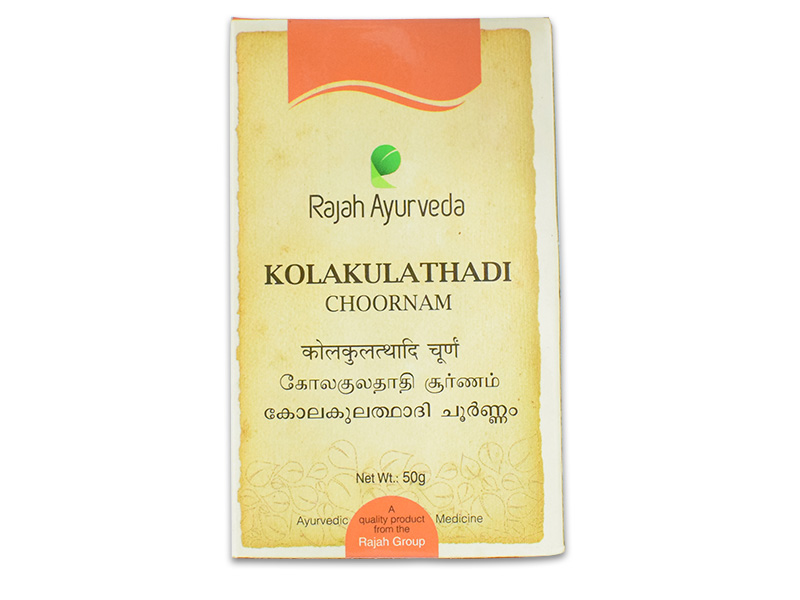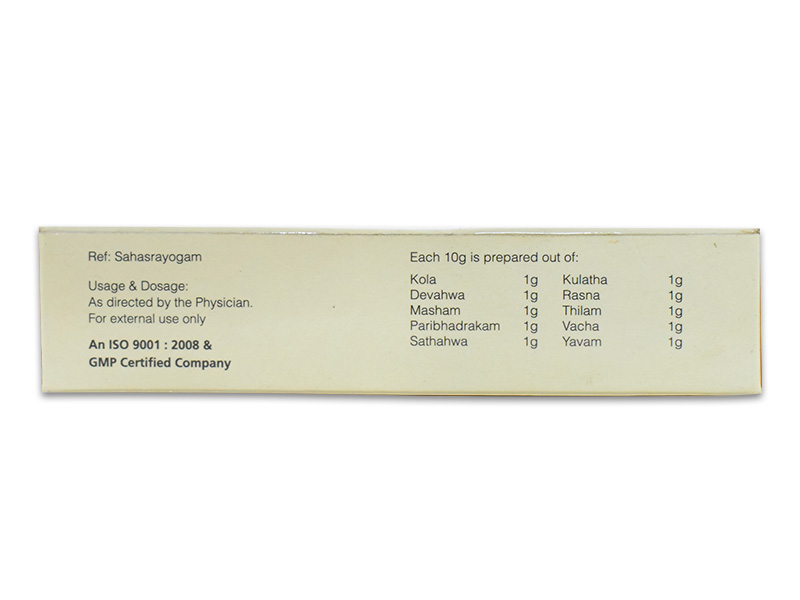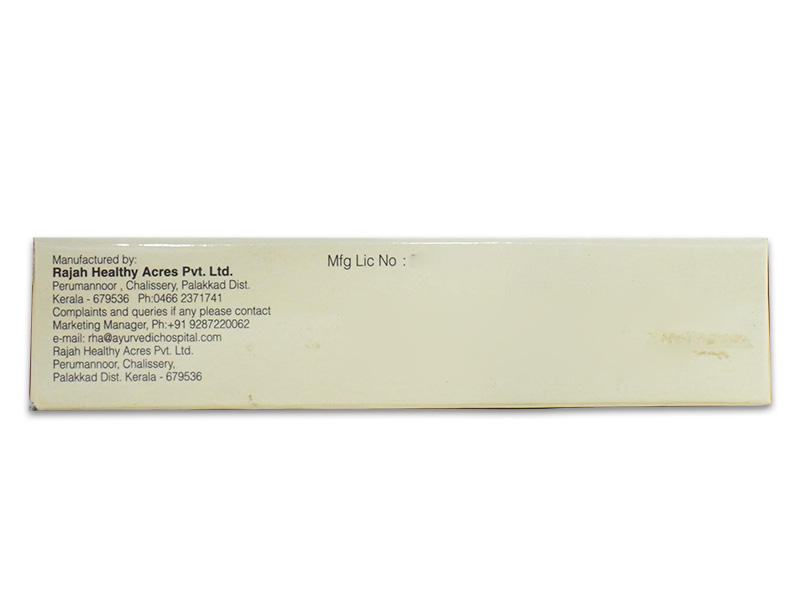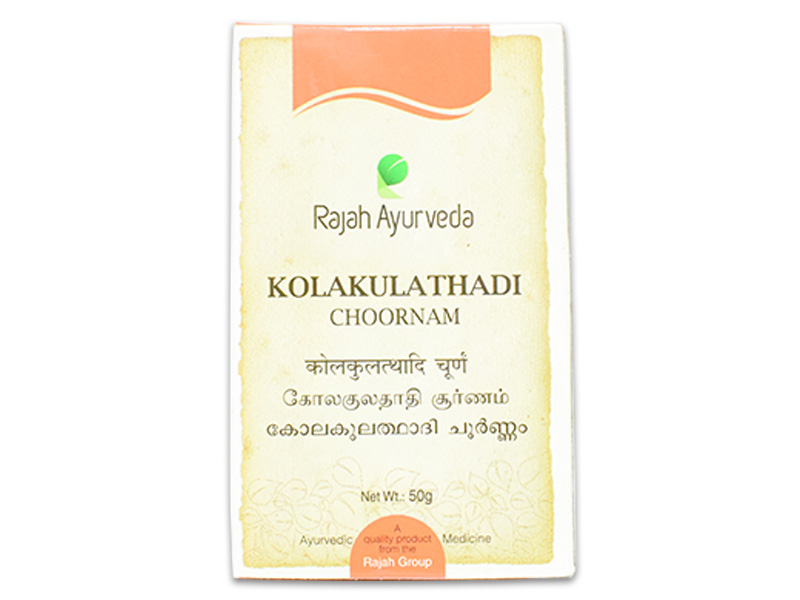Customer Care Number - 7604908226








KOLAKULATHADI CHOORNAM;
Kolakulathadi Choornam is an ayurvedic product. Choornam is a mixture of finely grounded herbs. Kolakulathadi Choornam is applied externally on the desired area to reduce inflammation and reduce pain. It is made from carefully selected, finely ground herbs. Being completely organic it has no side effects but should be avoided with pregnant women. As it is applied externally, it is used to fight pain in the joints. It is used to relieve pain and inflammation, in cases of paralysis, facial paralysis, rheumatoid arthritis, joint pains, back ache, shoulder pains, sciatica, lumbago, muscular sprain and inflammation, etc. It is also used in a fat reducing ayurvedic process called Udvartana.
It helps in restoring the balance of one dosha of the body Vatta. Vatta is a combination of space and air. It controls cell division, the heart, breathing, and the mind and these basic functions make it very important. People with unbalanced Vatta are highly susceptible to skin, neurological, and mental diseases.
It is a combination of a few powdered herbs which are mixed in a certain precise ratio. These herbs are Kola (Zizyphus jujube Lam.), Kulattha Horse gram (Dolichos biflorus Linn.), Suradaru Devadaru (Cedrus deodara), Rasna (Vanda roxburghi / Pluchea lanceolata), Masha Black gram (Phaseolus radiatus L.), Atasi (Linum usitatissimum Linn.), Kushta Saussurea lappa Vacha Acorus calamus, Shatahva Indian Dill Anethum sowa, Yava Barley Hordeum vulgare and Tailaphala castor fruit (Eranda).
ROLE OF INGREDIENTS;
Kola (Zizyphus jujuba) - is said to increase strength, stimulate appetite, and enhance liver health. When applied directly to the skin, it is also thought to promote wound healing, treat dry skin, ease sunburn, and reduce wrinkles and other signs of aging.
Kulattha (Dolichos biflorus) - mainly used as tonic, astringent, diuretic, and are also recommended in asthma, bronchitis, urinary discharges, hiccoughs, ozoena, heart trouble and other diseases of brain.
Devadaru (Cedrus deodara) - act as expectorant and useful in curing piles, epilepsy, stones in the kidney and bladder, useful in fevers and in many other disorders. The oil is antiseptic in nature and helpful in curing skin diseases, wounds, urogenital diseases, diaphoretic as well as insecticide.
Yava (Hordeum vulgare) - used as an aid in the treatment of a variety of conditions such as diabetes, skin abnormalities, arthritis, digestive diseases, weight loss, detoxifying and cancer
Shatapushpa (Anethum sowa) - is used carminative for the treatment of flatulence, colic and hiccups of infants and children, antioxidant, antimicrobial and antispasmodic agent.
Mashah (Vigna mungo) - has been reported pharmacologically to possess anti-inflammatory activity. Anti-inflammatory activity is due to ethanol extracts mainly polyphenols. The seeds of nearly all species of Vigna have antioxidant properties and are used to treat different diseases like rheumatism, liver diseases, etc.
Anjani (Memecylon umbellatum) - are used as a cooling astringent; used in conjunctivitis as a lotion; and given internally in leucorrhoea and gonorrhea. A lotion prepared from leaves is used to treat eye troubles. The leaves are reported to possess antiviral activity
Masha Black gram (Phaseolus radiatus) - contains carotene, saccharides, phospholipid and protein. Hepatic-protective and anti-tumor, blood-fat-reducing and anti-atherosclerosis. Sweet, cold. Clearing heat, detoxifying, relieving summer heat and inducing urination.
Atasi (Linum usitatissimum Linn.) - commonly known as Flaxseed has traditionally been used for the management of diarrhea and gastrointestinal infections. This study was planned to assess pharmacological basis for the medicinal use of Flaxseed in infectious and non-infectious diarrhea.
Kushta (Saussurea lappa) - roots have been widely used in chronic gastritis, rheumatoid arthritis, asthma and bronchitis in traditional medicine and in inflammation-related diseases . Its roots are used especially in Siddha for the medicinal purposes [
Vacha (Acorus calamus) - is also used as a calming medicine (sedative), to induce sweating, and to treat rheumatoid arthritis and stroke. Some people chew calamus to remove the smell of tobacco, as a stimulant, to increase their sense of well-being, and as a hallucinogen.
BENEFITS;
It reduce pain and inflammation particularly in the joints and the muscles.
Also, helps in restoring the balance of Vatta (a dosha in the body).
It is used to relieve pain and inflammation, in cases of paralysis, facial paralysis, rheumatoid arthritis, joint pains, backache, shoulder pain, sciatica, lumbago, muscular sprain, and inflammation, etc.
INDICATIONS;
It is used to treat facial paralysis,
It is used to treat rheumatoid arthritis,
It is used to treat joint pains,
It is used to treat backache,
It is used to treat shoulder pain,
It is used to treat sciatica,
It is used to treat lumbago,
It relieves pain and inflammation in paralysis
It is used to treat muscular sprain, and inflammation, etc.
DIRECTIONS FOR USAGE;
External use;
It should be mixed with vinegar or water and applied to the desired area.
SAFETY INFORMATION;
Read the label carefully before use.
Do not exceed the recommended dosage.
Keep out of the reach of children.
Use under medical supervision.
Store in a cool dry place away from direct sunlight and heat.
| Indication | Knee pain Joint and muscle disorders Anti-inflammatory Useful in joint pain Arthritis Musculoskeleytal disorders Osteoarthritis Myositis Fibrositis Cervical and lumbar spondylosis |
|---|---|
| Ingredients | Kola - 1g Devahwa - 1g Masham - 1g Paribhadrakam - 1g Sathahwa - 1g Kulattha - 1g Rasna - 1g Thilam - 1g Vacha - 1g Yavam - 1g |
| Dosage | As directed by physician |